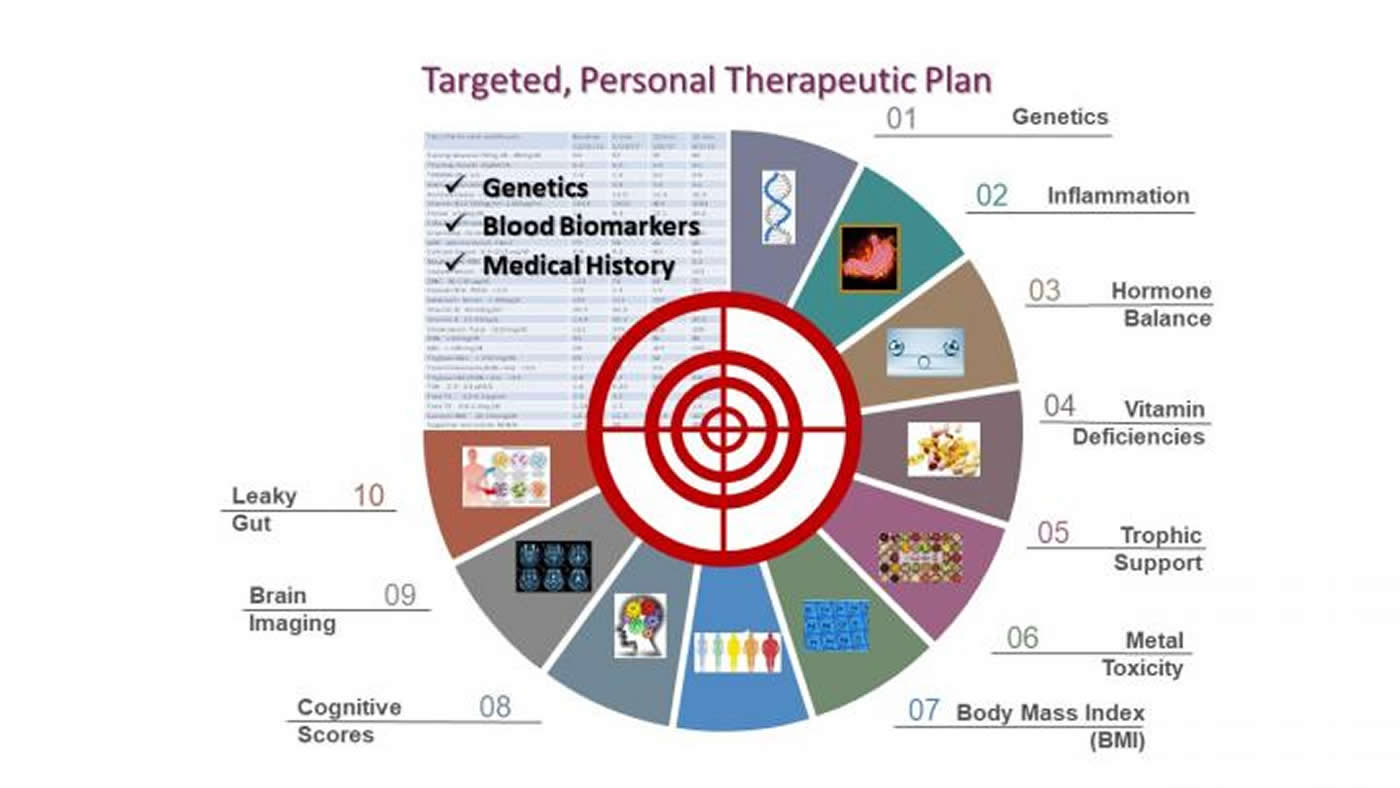Summary: Study reports success in treating cognitive decline and memory loss associated with Alzheimer’s disease with the aid of personalized precision medicine.
Source: IOS Press
Cognitive decline is a major concern of the aging population. Already, Alzheimer’s disease affects approximately 5.4 million Americans and 30 million people globally. Without effective prevention and treatment, the prospects for the future are bleak. By 2050, it is estimated that 160 million people globally will have the disease, including 13 million Americans, leading to potential bankruptcy of the Medicare system. Unlike several other chronic illnesses, Alzheimer’s disease is on the rise–recent estimates suggest that Alzheimer’s disease has become the third leading cause of death in the United States behind cardiovascular disease and cancer. Since its first description over 100 years ago, Alzheimer’s disease has been without effective treatment. While researchers continue to seek out a cure, it is becoming clear that there are effective treatment options. More and more research supports the conclusion that Alzheimer’s disease is not a disease of only Beta Amyloid plaques and Tao tangles but a complex and systemic disease. In this study of patients with varying levels of cognitive decline, it is demonstrated how a precision and personalized approach results in either stabilization or improvement in memory.
Interventions to stop the progression of Alzheimer’s disease have been marginally successful at best. This study uses a more comprehensive, personalized approach addressing each participant’s unique risk factors. “The findings, published in the Journal of Alzheimer’s Disease Reports, are encouraging and indicate that a more extensive clinical study is warranted”, said Brian Kennedy, PhD, Director of The Centre for Healthy Aging, National University Health System, Singapore and Chief Scientific Officer, Affirmativ Health.
The Affirmativ Health scientific team, after thorough review of published research, has developed a comprehensive approach to addressing scientifically supported risk factors that have been rigorously defined as interventions to promote prevention, increased resiliency, and stabilization of brain function in the realm of AD and dementia. Utilizing cutting edge technology in concert with in-person coaching and consultation, we are demonstrating that a multi-modal and personalized approach promotes an improved resiliency and restoration of optimal brain function. The personalized therapeutic program includes genetics, an extensive blood panel, medical history and lifestyle data to evaluate relevant metabolic risk factors and nutrient levels associated with cognitive health. “Target laboratory levels differ from standard laboratory ranges as the goal is to reach optimized levels for cognitive health”, Ginger Schechter, MD, Chief Medical Officer, Affirmativ Health
The study approach considers more than 35 factors known to contribute to cognitive decline. Results demonstrate that certain of those factors are more affected than others again demonstrating the need for a more precise treatment plan. “This study supports the need for an approach that focuses on a one-size fits one, not a one-size fits all, approach that comprehensively assesses all involved risk factors affecting memory loss”, Denise M Kalos, CEO Affirmativ Health

In conjunction with the publication of this vital study, and to expose alternative treatment options for Alzheimer’s disease and cognitive decline, the team at Affirmativ Health has written a book, Outsmart your Brain – an Insider’s Guide to Life-Long Memory. “Memory is not something that should diminish with age; you are never too young to start developing healthy habits that can ultimately impact your cognition,” Outsmart Your Brain. This book leverages the foundation of Affirmativ Health’s research to deliver a tips and tools guide for the maintenance of good cognitive health. “Far too few people understand how critical lifestyle and dietary choices are for brain function. ‘Outsmart Your Brain’ is an important tool to get this information into the hands of those who should know it, everyone!, in easy-to-understand language”, Ryan R. Fortna, MD, PhD, Chief Medical/Scientific Officer, ADx Healthcare.
About this Alzheimer’s disease research article
Source:
IOS Press
Media Contacts:
Denise M Kalos – IOS Press
Image Source:
The image is credited to Affirmativ Health.
Original Research: Open access
“A Comprehensive, Multi-Modal Strategy to Mitigate Alzheimer’s Disease Risk Factors Improves Aspects of Metabolism and Offsets Cognitive Decline in Individuals with Cognitive Impairment” by Schechter, Ginger; Azad, Gajendra Kumar; Rao, Rammohan; McKeany, Allison; Matulaitis, Matthew; Kalos, Denise M.; Kennedy, Brian K. JAD Reports.
Abstract
A Comprehensive, Multi-Modal Strategy to Mitigate Alzheimer’s Disease Risk Factors Improves Aspects of Metabolism and Offsets Cognitive Decline in Individuals with Cognitive Impairment
Background:
Alzheimer’s disease (AD) is a chronic condition that progresses over time. While several therapeutic approaches have been developed, none have substantially altered disease progression. One explanation is that the disease is multi factorial.
Objective:
Using the Affirmativ Health Personal Therapeutic Program (PTPr), we sought to determine whether a comprehensive and personalized program could improve cognitive and metabolic function in individuals diagnosed with subjective cognitive impairment, mild cognitive impairment, and early stage AD.
Methods:
35 individuals submitted blood samples and Montreal Cognitive Assessment (MoCA) scores, and answered intake questions. Individuals and caregivers participated in a four-day immersion program, which included Personal Therapeutic Plans (PTP), consultations with clinical practitioners, and explanations of the PTPr and PTP. Participants had follow-up by telemonitoring, with repeat blood sample analysis, updates regarding lifestyle choices, current medications and supplements, and MoCA testing at least once between 3 and 12 months after the PTPr.
Results:
By comparing baseline to follow-up testing, we determined several risk factor scores, including blood glucose and insulin levels, and levels of vitamins B12, D3, and E, improved either in the entire participant pool or specifically in individuals with measures outside the normal range for specific factors. MoCA scores were stabilized in the entire participant pool and significantly improved in individuals scoring 24 or less at baseline.
Conclusion:
Our findings provide evidence that a comprehensive and personalized approach designed to mitigate AD risk factors can improve risk factor scores and stabilize cognitive function, warranting more extensive and placebo-controlled clinical studies.






